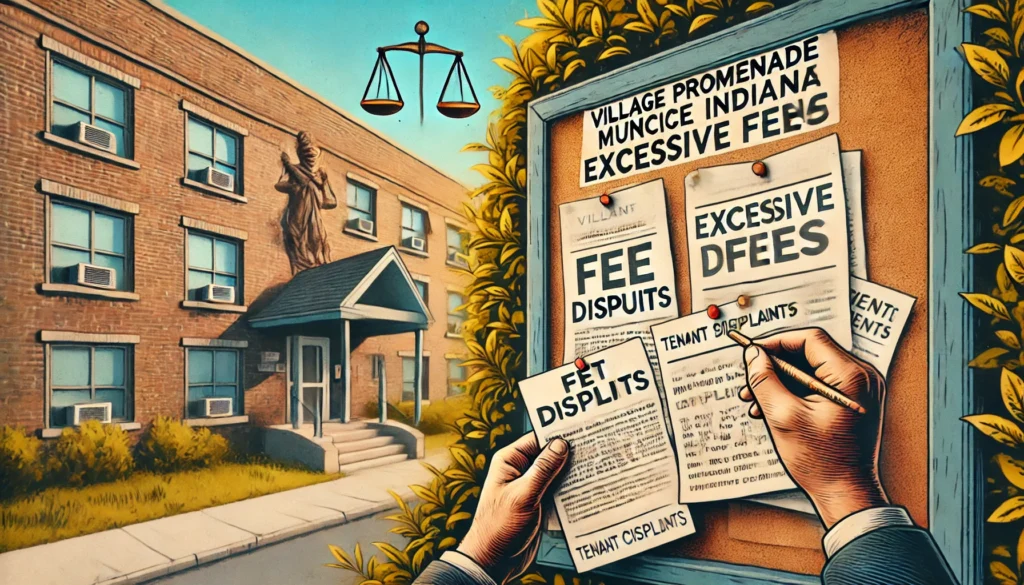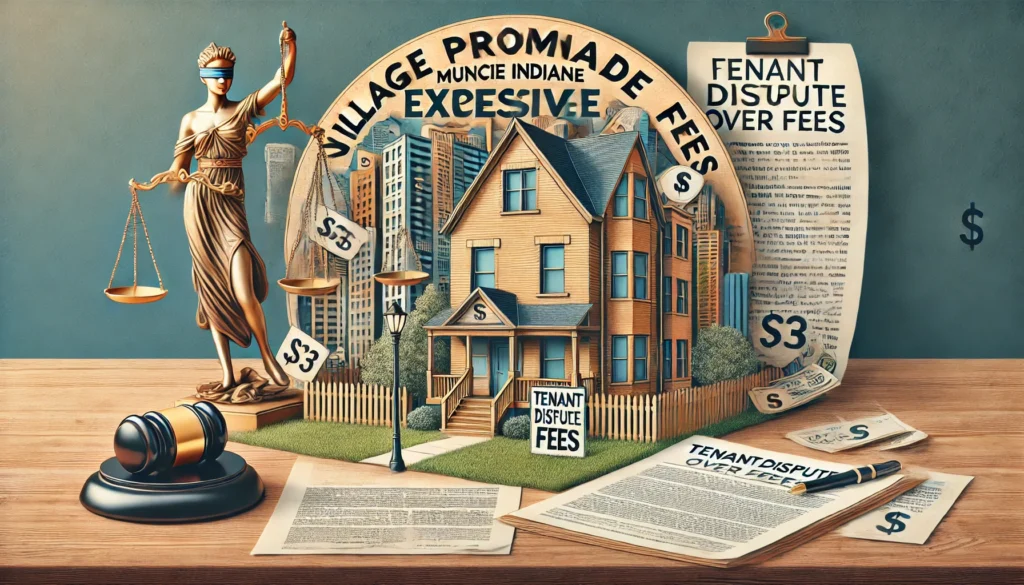Village Promenade Muncie Indiana Excessive fees: Legal Updates 2024

Village Promenade, a well-known apartment complex in Muncie, Indiana, has become the focus of controversy due to allegations of Village Promenade Muncie Indiana excessive fees charged to tenants. Located near Ball State University, it has long been a preferred housing option for students, offering modern amenities and a convenient location. However, many tenants have accused the management of imposing high, unexpected fees during and after their lease period. These claims have resulted in a lawsuit and raised broader concerns about tenant rights and fair rental practices.
Background
Village Promenade has built its reputation as a premium housing complex, catering to students and young professionals. It markets itself as a modern, fully equipped living space designed for convenience and comfort. Over the years, the complex has grown in popularity, but with this growth came numerous tenant complaints.
Tenants began voicing concerns about excessive fees charged at the end of their leases. These fees were often related to minor damages, routine maintenance, or “redecorating.” Many felt blindsided, stating that these charges were not clearly disclosed in their rental agreements. Eventually, the issue escalated, with tenants banding together to file a lawsuit against the property management, accusing them of unfair practices and violations of Indiana’s landlord-tenant laws.
Nature of the Alleged Fees
The controversy revolves around several types of charges that tenants claim are excessive and unfair.
Redecorating Fees:
Many tenants reported being charged for tasks like repainting walls or cleaning carpets, which are standard maintenance activities expected of landlords. These charges were categorized as “redecorating fees” and were often significant, ranging from $100 to $500 or more, depending on the apartment’s condition.
Wear-and-Tear Costs:
Indiana law specifies that landlords cannot charge tenants for normal wear and tear, such as small nail holes, minor scuffs, or worn carpets. Despite this, tenants allege they were billed for such items, with no detailed explanation provided.
Move-Out Cleaning Fees:
Cleaning charges at the end of a lease were another common complaint. Tenants state that they left their apartments clean but were still charged for professional cleaning, sometimes without receiving a breakdown of the costs.
Miscellaneous Fees:
Other unexpected costs included charges for replacing lightbulbs or batteries, repairing appliances, or fixing issues that tenants claim existed when they moved in.
The key complaint from tenants is that these fees were not transparently communicated in their lease agreements, leaving them unprepared and financially strained.
Tenant Complaints and Allegations
Tenants have voiced several grievances against Village Promenade:
- Unfair Charges: Many argue that the fees imposed by management are excessive and go beyond what is reasonable for normal maintenance.
- Lack of Transparency: Tenants claim that the fees were not clearly explained when they signed their leases. They also state that they were not informed of these charges during their tenancy and were only notified after moving out.
- Violations of Indiana Law: Indiana’s landlord-tenant laws protect renters from being charged for normal wear and tear. Tenants argue that Village Promenade violated these protections by charging for standard maintenance activities.
These complaints have fueled frustration and mistrust among tenants, some of whom have shared their experiences online, further amplifying the controversy.
Management’s Response
Village Promenade’s management has defended their practices, stating that:
- Maintenance Fees Are Necessary: Management argues that the fees are necessary to maintain the property’s high standards and ensure a quality living experience for future tenants.
- Charges Are Outlined in Leases: They assert that the fees are consistent with the terms of the lease agreements signed by tenants.
- Industry Standards: Management claims that similar fees are common in the rental housing industry and are a standard part of lease agreements.
Despite these defenses, management has faced criticism for the lack of detailed communication and for the impact of these fees on tenants, many of whom are students with limited budgets.
Legal Implications
The lawsuit filed by tenants against Village Promenade is centered on whether the fees violate Indiana’s landlord-tenant laws. The tenants’ legal team is arguing that:
- Improper Charges: The fees for wear and tear and routine maintenance are not permissible under state law.
- Breach of Lease Terms: The tenants claim that the charges were not adequately disclosed in their leases, making them unfair and potentially illegal.
- Lack of Itemized Bills: Failure to provide clear, itemized explanations of the fees is also being cited as a violation of tenants’ rights.
The case is still ongoing in 2024, but its outcome could have significant implications for rental practices across the state. A ruling in favor of the tenants could lead to stricter regulations on landlord practices and greater protections for renters.
Broader Impact
The controversy has highlighted several broader issues in the rental housing industry:
Increased Tenant Awareness:
The case has encouraged tenants to be more vigilant about understanding their lease agreements. Many are now documenting the condition of their apartments at move-in and move-out to avoid disputes.
Pressure on Landlords:
Property management companies may need to revise their practices to avoid similar lawsuits. Clearer communication and more transparent fee structures are likely to become standard in the industry.
Potential Policy Changes:
This case could prompt lawmakers in Indiana to introduce stronger tenant protection laws, ensuring greater clarity in rental agreements and limiting the types of fees landlords can impose.
Current Developments
As of late 2024, the lawsuit against Village Promenade remains unresolved. Both sides are presenting evidence to support their claims, and the case has attracted significant attention from tenant advocacy groups and housing policy experts. Meanwhile, Village Promenade has faced reputational damage, with many tenants and prospective renters expressing concerns about its practices.
Conclusion
The controversy surrounding Village Promenade Muncie Indiana excessive fees has underscored the importance of transparency and fairness in rental agreements. While the legal case is still ongoing, it has already highlighted the need for tenants to be informed about their rights and responsibilities. It also serves as a reminder for landlords to prioritize clear communication and ethical practices to maintain trust with renters.
The outcome of the Village Promenade Muncie Indiana excessive fees case could have far-reaching effects on rental housing policies, potentially leading to a fairer system for tenants across Indiana and beyond.
FAQs About Village Promenade, Muncie, Indiana: Excessive Fees
What are the main complaints about Village Promenade’s fees?
Tenants have reported being charged excessive fees for routine maintenance, such as repainting walls, cleaning carpets, and minor wear-and-tear issues. They claim these charges were not transparently outlined in their lease agreements and were often imposed after they moved out.
Are these fees legal under Indiana law?
Indiana law protects tenants from being charged for normal wear and tear. Tenants argue that Village Promenade’s fees for such items violate these protections. The legal case against Village Promenade is ongoing as of 2024, and the court’s ruling will determine whether these fees were lawful.
What is Village Promenade’s response to the allegations?
Village Promenade’s management defends the fees, stating that they are necessary for property upkeep and are in line with the lease agreements tenants signed. They also claim the fees are standard practice in the rental housing industry.
How can tenants protect themselves from unexpected fees?
Tenants should carefully review lease agreements before signing, ask for clarification on any potential fees, and document the condition of their apartment with photos during move-in and move-out. Keeping records of all communications with property management can also be helpful in disputes.
What impact could this case have on other rental properties?
If the court rules in favor of the tenants, it could set a precedent for rental practices in Indiana, requiring landlords to adopt more transparent fee structures. It might also encourage lawmakers to introduce stricter tenant protection laws to prevent similar disputes in the future.
Recommended Article:
Richie Roberts Defense Attorney: From Prosecutor to Advocate
Brighton Butler Divorce: A Closer Look at the Public and Personal Aspects
Joseph McGuire Lawyer Virginia Fax: A Key to Seamless Legal Processes
Timerline Venture Partners Streameast: Revolutionizing Digital Streaming
Timberline Lawsuit Kazaa: Challenges in the Digital Age of Copyright






































































































































































































































































































































































































































































































































